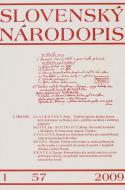Komunikácia ako atribút etnickej a socioprofesijnej identity (na príklade multietnického prostredia zaoceánskych lodí)
Communication as the Atribute of Ethnical and Socio-professional Identity (on Example of Multiethnical Territory of Cruise Ships)
Author(s): Zuzana KrátkaSubject(s): Anthropology
Published by: SAV - Slovenská akadémia vied - Ústav etnológie a sociálnej antropológie Slovenskej akadémie vied
Keywords: ethnical identity; socio-professional identity; lingua franca; verbal and nonverbal instruments of communication;; self-identification;
Summary/Abstract: I tended to investigate this theme after I experienced an extraordinary cooperation of people from all around the world on the cruise ships. In spite of their different origins and cultures (over 50 different ethnicities) which have been forming their behaviour and system of thinking, they shared this quite small living and working space without any conflicts. Indestructibility of the system which is created by particular circumstances, crew members and internal rules, interested me in era of inter-cultural conflicts so much, that I dedicated 15 months to its research. Round-up findings were lumped in my diploma thesis. From all factors connected with the theme of ethnical identity I have chosen those, which are possible to be observed in context of socio-professional identity as well. I attended following topics: communication, perception of time and place, religion, norms and rules and self-identification of crew members. This article is dedicated to the first mentioned category – communication. In its first part, I pay interest to lingua franca on cruise ships, which is English and I draw the attention on all realized differencies in using that language by crew members of various ethnicity. Crew members of each ethnic group use English in different ways, with different spelling, tense, rhytm and different context. That is why English even as a lingua franca instead of leading to unification, turns community of crew members into structuralized society of different and by the variants of English recognized groups. English, which crew members use in a communication with guests is then the atribute of their ethnical identity. In the second part, I pay attention to the version of English, which crew members use only during the communication with another crew members. This specific version of English called by its users (crew members) “ship language” is developed, used and understable only in the territory of cruise ships and only by the crew members, what is reflected in its name. Ship-language arose for the use of communication on the ship, where the most important part of crew member’s life is somehow connected with work. It is apparent from strong number of words in this language’s register which originally come from working sphere but are used in free time sphere as well. The fact that ship language as the communication system is only understable by crew members (of all nationalities) makes it the atribute of socio-professional identity. There won’t be serious conflict in a society, if its members will share some important part of their lives, if they will know about that and if they will consentingly reflect it together in their specific communication.
Journal: Slovenský národopis
- Issue Year: 57/2009
- Issue No: 1
- Page Range: 68 - 85
- Page Count: 18
- Language: Slovak

